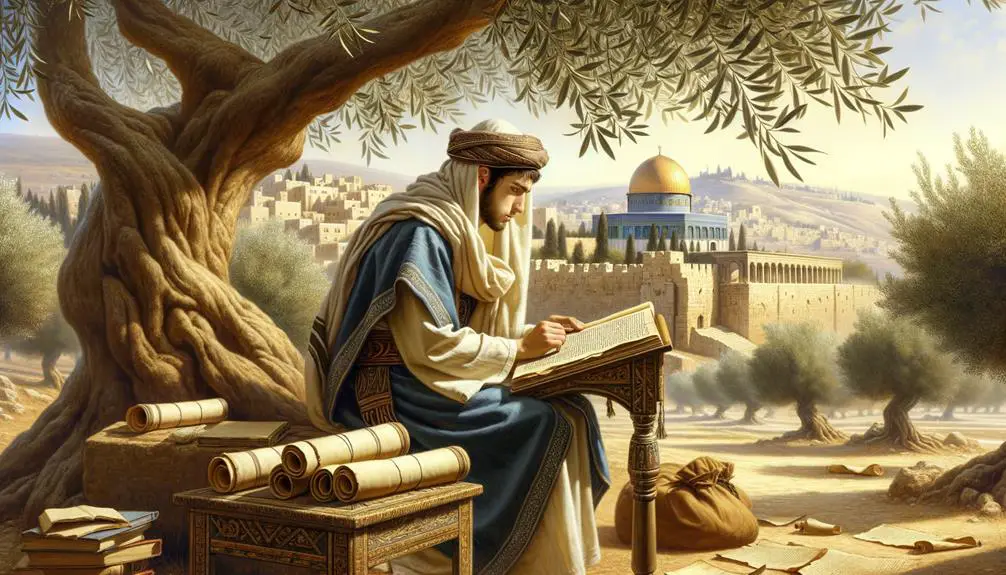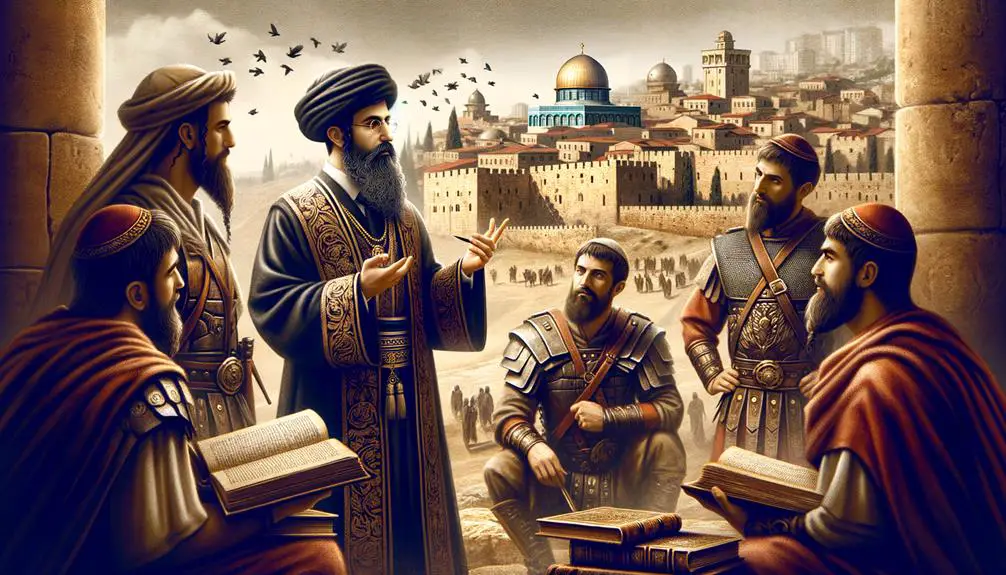Gain insights into the Bible's backdrop with Josephus, a Jewish historian whose works illuminate the first-century world, beckoning further exploration.

Who Is Josephus in the Bible
Navigating the murky waters of ancient texts, you might find Josephus isn't directly mentioned in the Bible, yet he's a beacon for understanding its context. As a Jewish historian who lived through the Roman destruction of Jerusalem, his writings offer a bridge to the first-century world, illuminating the backdrop against which the New Testament was penned.
Exploring his life, from a participant in the Jewish War to a Roman citizen, reveals why his accounts are pivotal for biblical studies. You'll find that his insights into first-century Judaism and the complexities of his relationship with the Romans paint a picture that's both intricate and indispensable for anyone keen to grasp the historical underpinnings of biblical narratives.
Key Takeaways
- Josephus is not a biblical figure but a Jewish-Roman historian from the 1st century AD.
- His works provide historical context and insights into the period of the New Testament.
- Josephus's writings help scholars understand first-century Judaism and early Christian origins.
- Although not in the Bible, his accounts corroborate and illuminate biblical narratives and settings.
Early Life of Josephus

Born in Jerusalem in AD 37, Josephus emerged from a priestly and royal lineage, setting the stage for a life deeply intertwined with the socio-political complexities of Judea under Roman rule. Your understanding of his early life is pivotal to grasp the unique position he held as a Jewish historian with Roman citizenship, a status that afforded him both protection and a platform to narrate the Jewish history from a perspective that straddled two worlds.
Josephus's educational background is a testament to his elite status and the intricate ties between Roman and Jewish cultures during this era. You'll find that he wasn't just well-versed in Jewish law and tradition but also received a Greco-Roman education. This blend of educational backgrounds equipped him with the tools to navigate both societies, allowing him to articulate the Jewish narrative in a manner that was accessible to the Roman world. His Roman citizenship, likely granted by the Flavian emperors, further underscores the duality of his existence and the unique lens through which he viewed the events of his time.
Analyzing Josephus's early life, you notice how his privileged upbringing and comprehensive education laid the groundwork for his future role as a historian and mediator between Jewish and Roman worlds. His ability to move within these spaces, coupled with the protection his Roman citizenship provided, positioned him as a crucial figure in the documentation and interpretation of Jewish history during a tumultuous period. Through Josephus, you gain insights into the complexities of identity, loyalty, and survival in the ancient world.
Role During the Jewish War
You'll find Josephus's role during the Jewish War was multifaceted, involving military leadership, active participation in the Jewish revolt, and significant contributions to historical accounts.
As a commander in Galilee, his strategies and decisions were pivotal in the initial stages of the conflict.
His eventual capture and collaboration with the Roman forces, alongside his extensive writings, offer invaluable insights into this tumultuous period.
Military Leadership
Josephus demonstrated exceptional military leadership during the Jewish War, strategically navigating the complexities of rebellion against Roman rule. His approach to battle tactics and leadership styles played a pivotal role in the conflict's early stages, showcasing a multifaceted understanding of warfare.
- Adaptability: Quickly adjusted to changing battlefield conditions.
- Strategic Planning: Excelled in laying out long-term strategies to counter Roman advances.
- Diplomacy: Used negotiation skills to forge crucial alliances.
- Innovative Tactics: Implemented unconventional warfare techniques to surprise the enemy.
- Leadership by Example: Inspired his troops through personal bravery and commitment.
Josephus' role wasn't just about leading in battles; it involved a deep comprehension of both the physical and psychological aspects of warfare, highlighting his profound impact on the conflict's dynamics.
Jewish Revolt Involvement
During the Jewish War, your involvement showcased a pivotal role, directly influencing the course and outcomes of this historic conflict. Your strategic mind shone through in both Roman negotiations and siege strategies, marking you as a key figure in this tumultuous period.
Your adept handling of Roman negotiations demonstrated a nuanced understanding of the complex political landscape, leveraging your position to navigate through treacherous diplomatic waters. Furthermore, your implementation of innovative siege strategies underscored your military acumen, significantly impacting the defense tactics employed.
This dual approach not only highlighted your significance in the war effort but also cemented your legacy as a master strategist, skillfully balancing the fine line between military engagements and diplomatic dealings.
Historical Accounts Contribution
How did your contributions to historical accounts shape our understanding of the Jewish War? Your detailed narratives offer an unparalleled view of this tumultuous period, marked by insightful descriptions of the siege and fall of Jerusalem. Clear delineation of the factions within the Jewish resistance. Evidence of Roman collaboration, revealing the complexities of your own position. Accounts of Flavian patronage, which underscore the political dynamics at play. Analysis of the strategic maneuvers on both sides, providing a comprehensive understanding of the conflict.
Your work not only serves as a primary source for historians but also as a critical lens through which the intricate interplay of power, rebellion, and diplomacy during the Jewish War is better understood. Your role, amidst these tumultuous events, is pivotal in bridging the past with the present.
Major Works and Contributions
You'll find Josephus's major works pivotal in understanding not only the historical landscape of Judaism but also its profound impact on Christian theology. His meticulous accounts challenge and refine our grasp of historical accuracy, providing a bridge between Jewish and Christian narratives.
Moreover, his writings have been instrumental in shaping the perception of Judeo-Christian history, underscoring his significance in both religious traditions.
Historical Account Accuracy
Josephus's major works, notably 'The Jewish War' and 'Antiquities of the Jews,' offer a comprehensive, albeit sometimes contested, depiction of Jewish history, culture, and its intersections with the Roman world. Through textual analysis and archaeological evidence, scholars have scrutinized his accounts:
- Textual Analysis: Dissects his narratives, comparing them with contemporary sources.
- Archaeological Evidence: Supports or refutes his descriptions of locations and events.
- Bias Examination: Analyzes potential biases due to his Roman affiliations.
- Historical Correlations: Cross-references his accounts with other historical records.
- Cultural Insights: Offers invaluable insights into ancient Jewish and Roman cultures.
These methods reveal a complex picture of Josephus's accuracy, showing that while not infallible, his works are crucial for understanding the era he chronicled.
Impact on Christianity
Turning our focus from the historical accuracy of Josephus's accounts, we now explore his significant impact on Christianity through his major works and contributions. Josephus's theology, meticulously woven through his narratives, offered early Christians a bridge between Jewish history and the emerging Christian doctrine.
His works, especially 'Antiquities of the Jews,' have been pivotal for Christian scholars seeking to understand the socio-political context of Jesus's time. By providing detailed accounts of Jewish history, customs, and laws, Josephus inadvertently enriched Christian adaptations of these narratives, allowing for a deeper theological exploration and integration.
His writings have thus become a cornerstone in Christian historiography, serving as a critical reference point for theological studies, sermons, and Christian education.
Josephus and the Romans

Josephus's intricate relationship with the Romans showcases a blend of survival strategy and political maneuvering that significantly influenced his historical writings. After being captured during the Jewish Revolt, Josephus's transition from a Jewish commander to a Roman citizen is a tale of Roman diplomacy and cultural assimilation. His adeptness at navigating the complex political landscapes of the time allowed him to gain favor with the Roman elite, including the Flavian dynasty, which ultimately granted him Roman citizenship and a pension.
Josephus's alignment with the Romans wasn't merely a matter of personal survival but also played a pivotal role in how events were recorded and interpreted. His works are laced with instances that reflect his Roman affiliations, often portraying the Romans in a favorable light while still trying to maintain a semblance of loyalty to his Jewish roots.
Here are key aspects of Josephus's interactions with the Romans:
- Survival Tactics: Josephus's shift in allegiance was a strategic move to ensure his survival amid the tumultuous times.
- Cultural Assimilation: His adoption of Roman customs and language underlines the extent of his integration into Roman society.
- Political Acumen: Josephus displayed remarkable political savvy in aligning himself with the powerful Flavian dynasty.
- Historical Narratives: His historical accounts provide a unique perspective that blends Jewish history with Roman ideologies.
- Legacy: Josephus's works have become invaluable resources for understanding the sociopolitical dynamics of the era, bridging gaps between Jewish and Roman histories.
Josephus's life and work exemplify the complexities of identity, allegiance, and survival in the face of imperial power.
Insights Into First-Century Judaism
Delving into first-century Judaism through the lens of Josephus offers unparalleled insights into the religious, social, and political intricacies of the era. As you explore his works, you're not just digesting a historical account; you're uncovering the vibrant tapestry of Jewish life that was deeply entwined with the Roman world. Josephus, being a Jewish priest, historian, and a one-time military leader against Rome, had a unique vantage point. His detailed descriptions shed light on various Jewish sects, including Pharisees, Sadducees, and Essenes, each with their distinct beliefs and practices, revealing a complex and diverse Jewish society.
His accounts provide a crucial backdrop to understanding the Dead Sea Scrolls. Discovered much later, these scrolls offer a glimpse into the religious practices and thoughts of a sect, likely the Essenes, that Josephus described. This parallel not only validates his narratives but also deepens our comprehension of the sectarian dynamics within Judaism at the time.
Furthermore, Josephus's writings serve as a bridge to Rabbinic Literature, an essential component of later Jewish thought and law. By detailing the Pharisaic traditions, he indirectly illuminates the roots of Rabbinic Judaism. His descriptions of Pharisaic beliefs and practices, when compared with Rabbinic texts, allow you to trace the evolution of Jewish legal and theological thought from the Second Temple period into the Rabbinic era.
Thus, Josephus doesn't just inform you about the historical events of the first century; he offers a lens through which the tapestry of Jewish religious, social, and political life becomes accessible, enriching your understanding of this pivotal era in Jewish history.
Josephus's Impact on Biblical Studies

In the realm of biblical studies, Josephus's works serve as a critical bridge, illuminating the historical and cultural context of the Scriptures. His detailed accounts of Jewish history, culture, and beliefs during the Second Temple period offer scholars a unique lens through which to view the texts of the Bible. Through textual analysis and archaeological corroboration, his writings enhance our understanding of the Bible in several profound ways:
- Historical Context: You gain insight into the political, social, and religious dynamics of the time, providing a backdrop against which the narratives of the New Testament can be more fully understood.
- Cultural Practices: Josephus's descriptions of Jewish rites, customs, and laws offer a deeper understanding of the cultural practices mentioned in the Bible.
- Textual Analysis: His work aids in the textual analysis of the Scriptures, allowing scholars to cross-reference events and figures mentioned in both the biblical texts and his writings.
- Archaeological Corroboration: Josephus's accounts often align with archaeological findings, lending credence to the historical accuracy of the Bible.
- Sectarian Movements: He provides invaluable information on various Jewish sects of the time, including the Pharisees, Sadducees, and Essenes, shedding light on the religious landscape that shaped the development of early Christianity.
Controversies and Criticisms
Despite his significant contributions to biblical studies, Josephus's works have not escaped controversy and criticism. You'll find that much of the debate centers around historiographical debates and the ethical implications of his writings. Josephus, having defected to the Roman side during the Jewish-Roman War, is often criticized for his alleged bias towards the Roman perspective. This bias raises questions about the accuracy and reliability of his historical accounts, especially concerning the events of the First Jewish–Roman War.
Aspect |
Concern |
Impact on Scholarship |
|---|---|---|
Historical Accuracy |
Suspected embellishments and omissions |
Questions the reliability of events described |
Bias |
Pro-Roman perspective; possible downplay of Jewish resistance |
Challenges the impartiality of the narrative |
Ethical Implications |
Josephus's survival strategy; defection to Rome |
Sparks debate on moral judgment and historical interpretation |
These controversies aren't just academic nitpicking; they're crucial in understanding the complexities of interpreting ancient texts. Historiographical debates revolve around the methodologies Josephus employed in his recounting of history. Critics argue that his narratives might be colored by his attempts to curry favor with Roman patrons, thereby influencing his portrayal of various events and figures.
The ethical implications of Josephus's actions and writings further complicate his legacy. His defection to the Romans, seen by some as a pragmatic choice for survival, is viewed by others as an act of betrayal. This moral ambiguity forces readers to grapple with the difficult choices individuals face in times of war and the impact of those choices on how history is recorded and remembered.
Understanding these controversies and criticisms is essential for a nuanced appreciation of Josephus's work and its place within biblical scholarship.
Frequently Asked Questions
How Has Josephus's Work Influenced Modern Historical Fiction Set in the First Century?
Josephus's work has significantly influenced modern historical fiction set in the first century by providing rich details and insights into the era.
You'll find that authors often draw on his accounts to employ authentic literary techniques and foster deep character development.
His descriptions of events, social customs, and political dynamics enable writers to create vivid, realistic settings and complex characters, enriching the narrative depth and historical accuracy of their stories.
Are There Any Significant Archaeological Discoveries That Have Validated or Contradicted Josephus's Accounts?
You're scrolling through your feed and stumble upon a hot debate: Has archaeology ever proved or debunked Josephus's tales?
Absolutely, there have been significant finds that both support and challenge his narratives.
Experts scrutinize manuscript authenticity and wrestle with dating controversies, analyzing every shard and scroll.
These discoveries provide a detailed, analytical lens, offering an authoritative glimpse into the ancient world's reality versus Josephus's documented accounts.
How Do Contemporary Jewish Scholars View Josephus, Given His Complex Relationship With the Romans?
Contemporary Jewish scholars often view Josephus with mixed feelings due to his Roman collaboration. You'll find that they scrutinize his writings for insights into Jewish identity during a tumultuous period.
Despite his controversial actions, they acknowledge his historical accounts' value, offering a rare glimpse into 1st-century Judaism and the complexities of Jewish-Roman relations. However, his allegiance to Rome casts a shadow, prompting debates on his motivations and the impact on his work's credibility.
What Are the Most Notable Differences Between Josephus's Portrayal of Events and Those Found in the Dead Sea Scrolls?
You're delving into a complex comparison: Josephus's accounts versus the narratives in the Dead Sea Scrolls.
Josephus often provides a Roman-centric viewpoint, while the Scrolls offer a more localized, perhaps purer, Jewish perspective.
This contrast hinges on manuscript authenticity and interpretation methodologies, leading to divergent narratives on events and ideologies.
Analyzing these differences reveals deeper insights into historical contexts and the shaping of religious and cultural identities over time.
Has Josephus's Depiction of Women in His Historical Accounts Affected the Study of Gender Roles in Ancient Jewish Society?
Yes, Josephus's depiction of women has significantly influenced the study of gender roles in ancient Jewish society.
Through feminist critique and literary analysis, scholars have dissected his historical accounts, revealing biases and shedding light on women's roles and representations.
This examination not only challenges traditional narratives but also enriches our understanding of gender dynamics, highlighting the impact of Josephus's work on modern interpretations of ancient texts and societal structures.
Conclusion
So, you've traipsed through the life and times of Josephus, a man who swapped sides faster than a politician changes promises. His tales, a blend of self-preservation and keen observation, offer a backstage pass to the first-century CE drama.
Despite the controversies nipping at his heels, Josephus's works remain a goldmine for scholars thirsty for insights into Judaism and the early whispers of Christianity. Remember, in the world of ancient texts, it's Josephus's account that still manages to steal the limelight, flaws and all.



Sign up